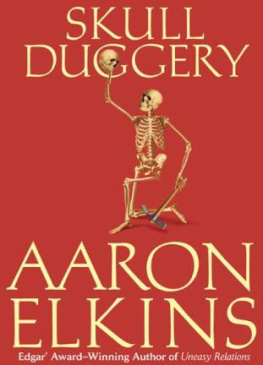Aaron Elkins - Little Tiny Teeth
Here you can read online Aaron Elkins - Little Tiny Teeth full text of the book (entire story) in english for free. Download pdf and epub, get meaning, cover and reviews about this ebook. genre: Detective and thriller. Description of the work, (preface) as well as reviews are available. Best literature library LitArk.com created for fans of good reading and offers a wide selection of genres:
Romance novel
Science fiction
Adventure
Detective
Science
History
Home and family
Prose
Art
Politics
Computer
Non-fiction
Religion
Business
Children
Humor
Choose a favorite category and find really read worthwhile books. Enjoy immersion in the world of imagination, feel the emotions of the characters or learn something new for yourself, make an fascinating discovery.

- Book:Little Tiny Teeth
- Author:
- Genre:
- Rating:3 / 5
- Favourites:Add to favourites
- Your mark:
- 60
- 1
- 2
- 3
- 4
- 5
Little Tiny Teeth: summary, description and annotation
We offer to read an annotation, description, summary or preface (depends on what the author of the book "Little Tiny Teeth" wrote himself). If you haven't found the necessary information about the book — write in the comments, we will try to find it.
Little Tiny Teeth — read online for free the complete book (whole text) full work
Below is the text of the book, divided by pages. System saving the place of the last page read, allows you to conveniently read the book "Little Tiny Teeth" online for free, without having to search again every time where you left off. Put a bookmark, and you can go to the page where you finished reading at any time.
Font size:
Interval:
Bookmark:
Little Tiny Teeth
Aaron Elkins
PROLOGUE
Peru: The Upper Amazon Basin, August 4, 1976
They knew, being Chayacuros, that the waking world, the world we think we see, is nothing but illusion. The real world, the true bonds between causes and their effects, is revealed only through the ritual drinking of ayahuasca. This they both had done under the ceremonial ministrations of old Chaya. The bitter brew had first purged and purified them, and then the Other World beings had come to guide them.
They have killed all the plants in their own land, these white people, the bird-headed spirit-helper had told them through the shamans mouth. Now they come to destroy ours. And then the government will come and burn our village. It is up to you to see that this does not happen.
They had agreed to undertake the task. For the last three hours, silent and unseen, they had been observing the three white men who had made camp not far from the village the night before and were now stirring. But in the true world, as in the false, there were separate realities; there was room for differences of opinion.
I say kill them now. Matsiguenga, the younger of the two, spoke in sibilant whispers, but he smote his naked, hairless chest with his fist for emphasis. We have wasted enough time.
The older man, Jabuti-toro, took his time replying, as befitted someone wiser. No. They may not be from the government. They may be blameless.
So what? They are strangers; they have no relatives. Who would avenge them? Who would even know?
They did not look at each other as they talked, for among the Chayacuro, for one man to look openly into anothers eyes is a deadly insult. They lay, propped on their elbows, peering narrow-eyed through giant, insect-eaten banana leaves and gnarled liana vines at the three men, who sat on the ground in a tiny clearing, their backs against a fallen tree trunk, breakfasting on manioc pancakes and cold coffee. Fifty feet further out, in a rough semicircle, lay another six Indians younger men and boys, less skilled at hiding, and trailing, and killing, proud to be in the company of the two leaders and eager to learn from them. The youngest, and perhaps the most eager of all, Matsiguengas nephew Shako, was not yet twelve.
In La Cosa Nostra, the two leaders, Matsiguenga and Jabuti-toro, would have been known as made men, men who had murdered made their bones to prove their worth as members of the Family. In the equally elliptical language of the Chayacuro, they were kakaram, powerful ones. Their power derived from their success at assassination. Both had killed enemies. Both had taken heads.
They were dressed almost identically. Of anything that we would describe as clothing, they had only woven kilts of dyed cotton. But they did not think of themselves as naked. Heavy necklaces of jaguar teeth, boar tusks, nuts, and shells hung in layered profusion around their necks. Their faces were dyed orange-red with achiote, their chests painted in ancient designs with white clay. Sharpened quills of blue and green macaw feathers pierced their nasal septums, and thin bamboo tubes and more feathers ran through their earlobes. Their glossy, black hair had been carefully trimmed into neat bangs and tightly bound with headbands.
Beside them lay nine-foot-long hardwood blowguns, meticulously carved and hollowed out and lovingly polished. Around each mans neck was slung a palm-frond quiver of darts from which dangled a small woven bag of cottonlike kapok. They were totally unafraid. The ayahuasca had made their bodies hard; they could not be harmed by others.
I say again, Jabuti-toro whispered forcefully. We wait. We do not kill those who are not our enemies.
Matsiguenga grunted his acceptance, but he had already made up his mind. The intruders would die. Jabuti-toro was getting old; he was more concerned about his wife and his four daughters than he was about protecting the village. His arutam the soul that sustained and protected him and gave him the courage to fight was leaving him; everyone could see that. He no longer had the stomach for killing. But Matsiguenga did. It would be up to Matsiguenga to teach the young ones how a man should act.
With the ayahuasca still coursing through his body, he could distinguish the future as if it were the present. Behind the lids of his closed eyes he saw how it would be. He would take the heads from the fallen whites, each with a single, slashing stroke of his machete. If Jabuti-toro wanted none, Matsiguenga would take all three, why not? He would run pieces of cincipi vine through their mouths and out their throats, and sling two of them over his back. The third he would allow young Shako to carry. Shako was impatient to take a head of his own, but he was still too young, too reckless, too out of control for that. Perhaps the honor of carrying a head would slake his thirst for blood for a while.
At the crossing of the River Yapo, where they had cached pottery jars, the shrinking process would begin. He would have Shako assist him. Shako was his sisters son; Matsiguenga was responsible for his learning. Among the Chayacuro, it was the maternal uncle, not the father, who was responsible for the education of a boy. They would slit the skin on the backs of the heads, then slip out the skulls and put them in the river as gifts for pani, the anaconda. They would boil the skins in river water, dry them, and then turn them inside out to scrape away the They are moving, Jabuti-toro said. They are leaving. We will follow them. His voice hardened. If they do not approach the hayo, we will let them go, do you understand?
And if they do?
Then they must be killed. But wait. Watch. They may not be what they seem.
Indeed, they were not what they seemed. They were two brothers named Frank and Theo Molina and their friend Arden Scofield. A trio of adventurous, young Americans, they had no interest in hayos, the coca-leaf gardens that the people of the Amazon had grown for a thousand years but were now deemed unlawful by the Peruvian government. All three were promising Harvard graduate students in ethnobotany, the study of how the worlds peoples make use of local plants for food, drugs, medicine, clothing, and anything else. Since getting their bachelors degrees, Arden and Theo had continued at Harvard, working toward their masters degrees, with specializations in South American flora. They had arrived in the Amazon only ten days earlier. Frank Molina six years older than his brother and five years older than Arden and the most serious scholar of the three had been living in Iquitos for the past ten months, completing the fieldwork for his Ph. D. dissertation on the Amazonian Indians use of Brunfelsia grandiflora, a member of the potato family, for curing gum disease.
But it was not this plant that these ambitious young men were after, nor any other medicinal botanical. It was Hevea brasiliensis the rubber tree, and through it they meant to make a great deal of money.
In all its existence, the Amazon had known something resembling prosperity but once: during the rubber boom of the late 1800s, when the strange, new, bouncy substance was king. The finest rubber in the world came from Amazonian trees, and huge fortunes were made in the rowdy, knockabout jungle towns at either end of the great Amazon river, Manaus, Brazil and Iquitos, Peru. But the seeds of ruin the literal seeds had already been sown. An English botanist named Henry Wickham had smuggled seventy thousand seeds out of South America in 1870 and gotten them to Malaysia. Five years later, the new plants were being tapped, and in thirty years they had become great trees superior even to those of the Amazon. By 1913, Malaysia and Singapore were the new capitals of the rubber market. The Amazonian boom had gone bust.
But in the early 1970s the Malaysian plantations of the giant Gunung Jerai rubber conglomerate were having troubles of their own; their trees were being decimated by a vicious disease that was known as South American leaf blight but was capable of attacking Hevea anywhere in the world. As it happened, Arden and Theo, who followed such things, had heard from one of their professors about an isolated region near the junction of the Huitoto River and the Amazon, only about thirty miles upriver from Iquitos, where rubber trees grew that were remarkably resistant to the blight. Arden, the quickest-minded and most decisive of the three, had contacted Gunung Jerai to determine if they were interested in seeing some of the seeds from these trees, the location of which he sensibly kept to himself.
Font size:
Interval:
Bookmark:
Similar books «Little Tiny Teeth»
Look at similar books to Little Tiny Teeth. We have selected literature similar in name and meaning in the hope of providing readers with more options to find new, interesting, not yet read works.
Discussion, reviews of the book Little Tiny Teeth and just readers' own opinions. Leave your comments, write what you think about the work, its meaning or the main characters. Specify what exactly you liked and what you didn't like, and why you think so.




